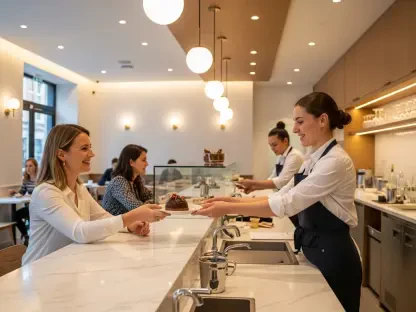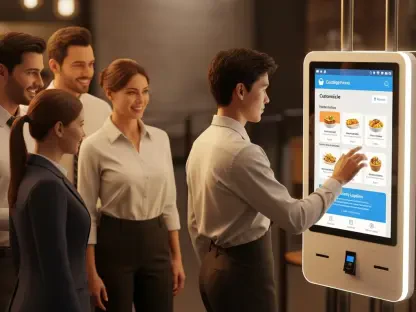In recent years, the integration of smart systems into restaurant operations has dramatically reshaped the landscape of this industry. The transition from traditional manual processes to automated systems has not only driven efficiency but also unlocked new avenues for sustainability and security. Modern restaurants increasingly recognize the vital importance of enhanced operational infrastructure and the potential gains in financial performance. With rising utility costs and the demand for superior efficiency, restaurant operators are leaning towards technologies that simplify and streamline various aspects of their business, paving the way for improved management and heightened customer experience. This article explores how smart systems are revolutionizing restaurant efficiency, delving into the multifaceted advantages of implementing cutting-edge tools and technologies.
The Mechanics of Smart Boiler Systems
Energy Efficiency and Cost Reduction
As energy costs continue to fluctuate, restaurants are under constant pressure to manage overheads efficiently—this is where intelligent boiler systems come into play. Traditional boilers frequently operate at maximum capacity irrespective of demand, leading to excessive energy consumption and inflated costs. Smart boilers, equipped with real-time monitoring capabilities and programmed to optimize output based on need, present a distinct departure from this inefficient norm. By implementing these smart systems, restaurants can achieve energy savings of up to 30 percent, translating to substantial yearly reductions in utility expenses.
Significant cost savings also stem from smart boilers’ predictive maintenance features. Unlike traditional systems, which often result in substantial repair bills due to unforeseen breakdowns, smart boilers anticipate potential issues before they become critical. Restaurants adopting these systems experience fewer disruptions in service during peak hours, such as dinner rushes. These predictive capabilities not only extend the equipment’s lifespan but also minimize emergency maintenance costs, allowing operators to allocate resources more effectively to other areas of their business.
Compliance and Sustainability
As energy efficiency standards evolve, smart boiler systems offer restaurants the ability to remain compliant while embracing sustainability. These intelligent systems, by reducing energy consumption, contribute to lower carbon footprints—a factor increasingly significant to consumers and stakeholders attentive to the environmental impact of businesses they patronize. Moreover, restaurants can qualify for various energy incentives and rebates available, thanks to their adherence to stringent compliance requirements facilitated by these advanced systems.
Beyond fiscal benefits, the move towards sustainability reflects positively on a restaurant’s brand image. Establishments perceived as environmentally responsible attract a clientele mindful of sustainability, thus encouraging loyalty and consistent patronage. This makes the integration of smart boilers not just a strategic operational decision but a marketing advantage. Embracing these systems, therefore, supports a broader strategy that encompasses compliance, cost efficiency, and a competitive edge in today’s eco-conscious market.
Enhancing Security with Smart Locks
Advanced Security and Accessibility
Security is a foundation that ensures trust and operational integrity within the dynamic restaurant environment—a sector where staff turnover can be high and typical locks fall short. The advent of smart locks addresses challenges by offering enhanced security features that surpass traditional locks’ limitations, such as susceptibility to duplicate keys and access cards. Incorporating smart locks in restaurants enables keyless entry and adaptable digital permissions, which can be adjusted seamlessly when personnel changes take place without the inconvenience of changing locks.
Furthermore, smart locks provide detailed logs of entry and exit, allowing managers and owners to monitor access in real-time. This overview not only elevates security but also ensures greater accountability among employees, reducing the risk of internal theft or unauthorized access. Integration with surveillance systems, alarms, and other smart environmental controls such as thermostats and lighting systems forms a cohesive security network that enhances control and oversight, ensuring that the restaurant’s premises remain secure and under proper surveillance around the clock.
Navigating Return on Investment
Initial investment in smart locks may present higher costs compared to traditional systems. However, the long-term return on investment far overshadows these initial expenses. Reduced locksmith costs, heightened security, improved space management, and fewer expenses related to the loss or theft of keys are a few key advantages. The swift implementation of digital permissions ensures a seamless transition when there are personnel shifts, avoiding the need for physical lock changes every time staff alterations occur.
Restaurants often realize their return on investment within one to three years as they see immediate gains in operational efficiency and staff compliance. This reduces the managerial burden associated with monitoring security and staff access, granting peace of mind and freeing employees to focus on enhancing service quality and customer satisfaction. The adoption of smart locks is thus a strategic decision that aligns with broader business objectives, offering tangible benefits that promote a secure and efficient operational framework.
The Broader Impact of Smart Systems
Supporting Scalability and Operational Excellence
The holistic adoption of smart systems provides a backbone for restaurant scalability and operational excellence. By streamlining essential back-of-house functions, restaurants can focus on refining customer experience and expansion strategies. Remote oversight facilitated by smart systems offers multi-location managers a comprehensive overview of their operations, allowing them to address anomalies and optimize processes efficiently without being physically present at each site.
This shift in management paradigms lightens the managerial load, enabling digital and effortless control of operational processes. This remote management capability extends beyond emergencies or service disruptions, also allowing operators to efficiently manage off-hour operations. This systemic upgrade contributes not only to operational effectiveness but also enhances overall business performance, thus positioning establishments advantageously in competitive markets.
Future-Proofing Against Industry Challenges
Amid evolving industry dynamics such as fluctuating labor markets, rising utility costs, and growing demand for enhanced security and sustainability protocols, smart system integration is an essential strategy for future-proofing restaurants. These innovations are not just complementary operational enhancements; they are indispensable assets enabling establishments to meet modern challenges with adeptness. As stakeholders, including customers and employees, demand more from businesses they engage with, restaurants will find that prioritizing technological upgrades solidifies their market position.
Moreover, as the market’s ecological awareness grows, restaurants equipped with smart systems and mindful of energy utilization and robust security measures are favored. From advocacy to implementation, the integration of these systems manifests a dedication to technological redundancy safety and responsible business practices. Consequently, the shift to smart systems is no longer merely an operational necessity but a critical differentiator in gaining and maintaining competitive advantage.
Realizing the Strategic Value of Smart Systems
As energy costs fluctuate, restaurants face constant pressure to manage overhead efficiently. Intelligent boiler systems offer a solution by addressing energy consumption issues. Unlike traditional boilers that run at full capacity regardless of demand, causing excessive energy use and higher costs, smart boilers use real-time monitoring and are programmed to adjust output according to actual needs. This efficiency can lead to energy savings of up to 30 percent, meaning significant annual reductions in utility expenses for restaurants.
Smart boilers also bring substantial savings through predictive maintenance. Traditional systems often rack up large repair bills due to unforeseen breakdowns. In contrast, smart boilers detect potential problems before they escalate, reducing disruptions during peak service times, like dinner rushes. This proactive approach extends the equipment’s lifespan and lowers emergency maintenance expenses, enabling restaurateurs to channel resources elsewhere in their operations. By optimizing both energy use and maintenance, smart boilers streamline resource allocation and operational efficiency.









